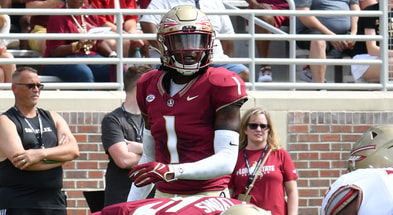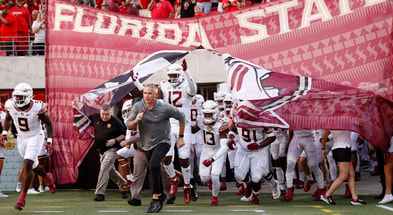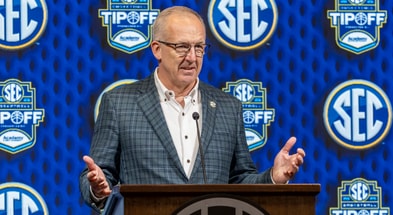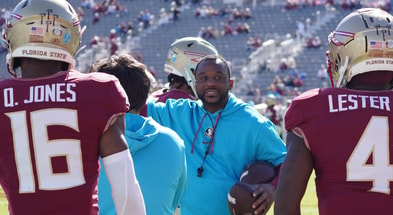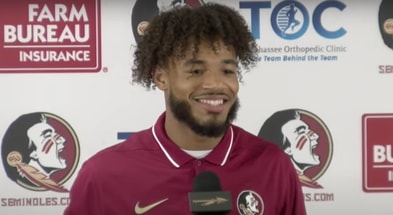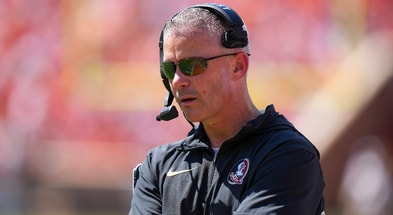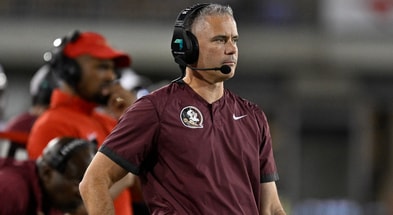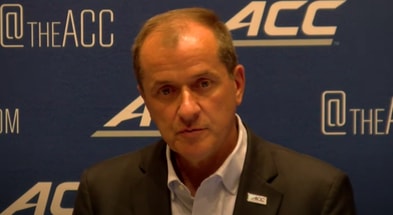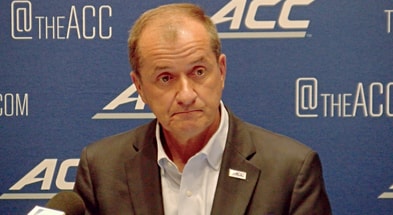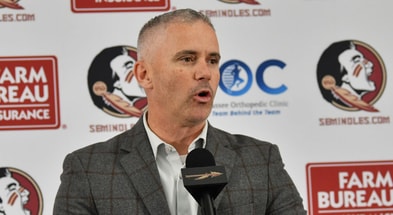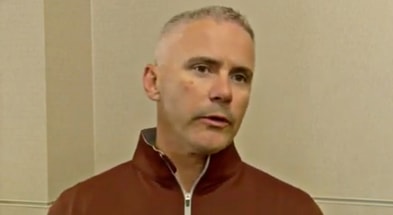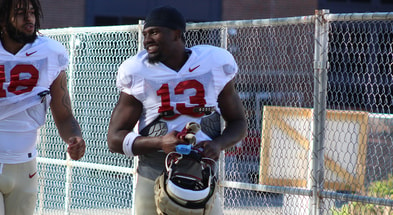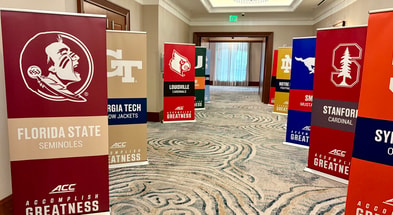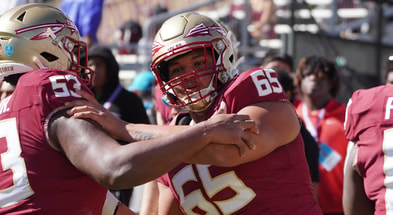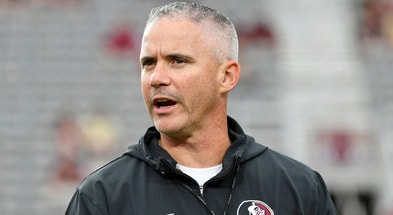FSU accuses ACC of deception, makes clear plan to leave conference

While Florida State and ACC officials wait for a North Carolina judge to rule on whether their case should proceed there, FSU’s attorneys on Wednesday filed a new response in Leon County Circuit Court accusing the conference of several “misrepresentations” to the court and also making it plainly clear that the Seminoles are planning to leave the league.
In three different paragraphs in the 10-page filing, which was obtained by Warchant late Wednesday, the attorneys use a version of the phrase, “after FSU exits the ACC,” as if it is a foregone conclusion.
In the Seminoles’ original complaint and amended complaint, both filed in recent months, that language was not used. And multiple FSU sources made it clear to Warchant at the time that the university wasn’t shutting the door on staying in the ACC — if, for instance, the league’s television revenue distribution model was reconfigured to reward Florida State and other schools that bring in the highest TV ratings.
Such a move always seemed extremely unlikely.
Now, it appears to be removed from consideration.
Throughout the 10-page document — Florida State’s response to the ACC’s motion to stay discovery in the Leon County case — the attorneys accuse the conference of repeatedly misrepresenting facts and also reaffirm their contention that the legal battle should take place in Florida, not North Carolina.
“Five words explain why the Motion should be denied: to get to the truth,” FSU’s attorneys wrote.
The ACC has asked for the Leon County case to be paused while North Carolina Judge Louis A. Bledsoe III rules on FSU’s request to stay or dismiss the conference’s lawsuit in that state. Arguments were heard on that motion last Friday, and a decision is expected to be delivered before April 9, which is when the Florida case is scheduled to begin.
But FSU points out that the ACC still hasn’t even provided Bledsoe with its television contracts with ESPN, which would be needed to make an informed decision.
“The sound and fury in three different state courts (Florida, and the Carolinas, South and North) are largely over lengthy contracts no one (including the Courts) has other than the ACC,” the lawyers wrote. “The ACC asks these Courts to construe the ‘terms and conditions’ of those ESPN Agreements yet expects those Courts to take the ACC’s word for those terms. That never ends well. … The record thus far demonstrates the extreme hazard of taking the ACC’s word for it.”
FSU’s response then cites several examples where it states the conference has been loose with the facts.
The attorneys point to an affidavit provided last month by University of Virginia President James E. Ryan, Chair of the ACC Board of Directors, explaining why the conference filed its preemptive lawsuit before FSU filed its own, and why the league could do so without a two-thirds vote of the conference membership.
“Under the ESPN Agreements unanimously approved by the Conference in 2016, the Conference was obligated to take all commercially reasonable actions necessary to protect the media rights that were provided to ESPN under those agreements,” Ryan stated in the affidavit.
A similar phrase was used in the ACC’s amended complaint against Florida State in mid-January.
SIGN UP: Join Warchant’s FSU Community for $1 today
But FSU’s attorneys argue in their latest filing that, “limited snippets of a ‘Commercially Reasonable Efforts’ clause contained in the ESPN Agreements were parsed out by the ACC” to bolster its case. In other words, the conference acted as if it had no choice but to sue the Seminoles.
But when Judge Bledsoe last week requested the official language from ESPN’s contract defining “commercially reasonable efforts,” this is what the ACC provided:
“Commercially Reasonable Efforts: With respect to a given goal or objective, the efforts that a reasonable commercial person or entity in the position of the party undertaking to pursue such goal or objective would use so as to achieve such goal or objective expeditiously; provided, however, that Commercially Reasonable Efforts shall not require any party to incur or become obligated to incur any expense not otherwise specifically provided for in this Agreement, including fees and expenses of counsel and consultants, or to incur any liability or waive or concede any right or claim that such party may have.”
The FSU attorneys contend that the ACC and James deliberately used “legerdemain” (deception) by citing that clause incorrectly: “When exposed, the ‘Commercially Reasonable Efforts’ clause does not in fact ‘require’ the ACC to take any ‘action.’ … Both the Unprovoked ACC Complaint and the Ryan Affidavit falsely state the Commercially Reasonable Efforts clause imposed upon the ACC a ‘contractual obligation’ to initiate an ‘action’ against its own member.'”
Florida State also accuses the ACC of fudging the truth when arguing the right of Commissioner Jim Phillips to unilaterally grant ESPN four additional years (from 2021 to 2025) to decide whether it will extend the ACC’s television contract through 2036. And FSU claims the conference has been duplicitous when it accuses the university of violating confidentiality agreements with the league and ESPN.
Top 10
- 1Trending
Diego Pavia
Responds to Ryan Williams' promise
- 2
Florida president
Santa Ono hire blocked
- 3New
Chipper Jones
Blasts 'disrespectful' coaches
- 4Hot
Wake Forest coach
Apology for slur directed at Vols
- 5
Ryan Williams
To take sledgehammer to Vandy
Get the On3 Top 10 to your inbox every morning
By clicking "Subscribe to Newsletter", I agree to On3's Privacy Notice, Terms, and use of my personal information described therein.
“When the ACC was forced to provide all the terms of the Confidentiality Clause, a different story emerged,” the lawyers wrote. “The actual language of the Confidentiality Clause … is as follows: Each party shall maintain the confidentiality of this Agreement and its terms and any other Confidential Information, except when disclosure is: . . . . (c) to each Conference Institution provided that each Conference Institution shall agree to maintain confidentiality of this Agreement, subject to the law applicable to each such Conference Institution.”
That last phrase is the key, according to FSU’s attorneys.
Even according to the league’s own documents, they claim, Florida State and its board could not keep any parts of the ESPN contracts confidential because it would violate Florida law.
Near the end of the 10-page response, FSU contends that none of those, however, is the biggest fabrication from the ACC.
“The most substantial misrepresentation concerns whether the ESPN Agreements reach the disputed property at all,” the lawyers wrote. (By “disputed property” they are referring to the television rights for Florida State’s home football games.)
“ESPN Agreements extend only only to home games played while FSU remains a ‘Conference Institution.’ After its exit, FSU will cease to be a ‘Conference Institution.’ If the ESPN Agreements have no application to the disputed property, then its taking is in no way ‘necessary for the Conference to perform the contractual obligations of the Conference expressly set forth in the ESPN Agreement.'”
FSU points out that Clemson is making the same argument in its recently filed lawsuit against the ACC in South Carolina.
This was one of the three times in the response that FSU’s attorneys referenced leaving the conference as nothing more than a formality.
Here were the others:
“Distilled to its essence, the FSU Board and the ACC dispute who takes ownership of certain
property after FSU exits the ACC.”
“The ACC’s objective is to take that Florida property (media rights) for the next dozen years after FSU exits the ACC and ceases to be a ‘Conference Institution.'”
The FSU response concludes by asking the court to deny the ACC’s motion and to proceed with the case in Leon County.
“These incidents bring into sharp focus that the ACC’s game of hide-the-ball must end,” the lawyers wrote. “The ACC’s Motion to Stay Discovery must be denied, and discovery must instead be accelerated.”
Talk about this story with other die-hard Florida State football fans on the Tribal Council.
